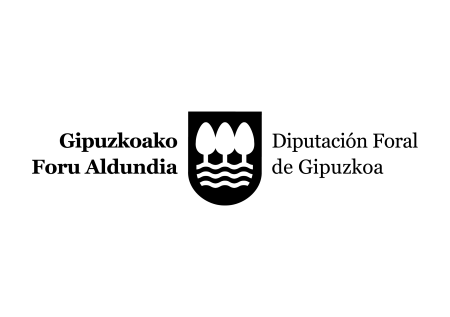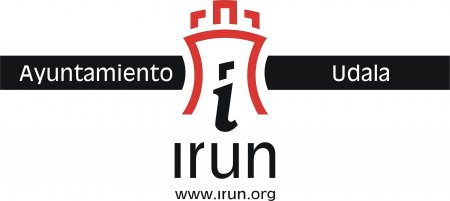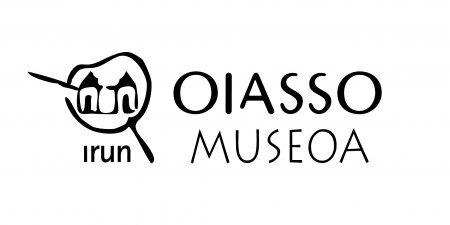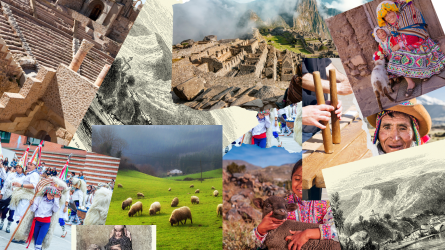
En torno al año 1000: un mosaico de culturas
The millennium of Gipuzkoa (1025-2025) as a reason to analyse this historical moment in the Iberian Peninsula and in other territories of the American continent and, thus, contribute to constructing a new and panoramic vision.
Description
The first known written mention of the existence of Gipuzkoa dates back to the year 1025; at that time, Muslim rule still extended to the middle and lower basin of the Ebro, while the Duero River marked the border with the Christian kingdoms on its final course. On both sides of the divide, there were also dynamic movements, changes and transformations that would give rise to a new territorial organisation.
On the occasion of Gipuzkoa's millennium, relevant examples of historical situations will be presented that will allow us to complete a polyhedric image of the Iberian Peninsula at that time. This image will be completed with a counterpoint constructed through the process of formation of the Andean cultures, from Tierra del Fuego to Ecuador (Wari or Huari cultures, Tiahuanaco, the Chincha culture, the Ichma, the Chimú kingdom...). In this way, starting from a focal episode, the scope of observation will be widened until parallel realities are brought together in an innovative process of rapprochement.
Objectives
Take advantage of Gipuzkoa's 1000th anniversary to publicise the innovative results of research centred around the year 1000, both on the Iberian peninsula and in the Andean territories of the Pacific.
Address the processes of change and historical transformations in the formation of cultural identities.
Share a comparative procedure that addresses parallel historical situations of genesis, transformation and mutation.
Activity directed to
- All public
- University student
- Students not from university
- Teachers
- Professionals
Organised by
In collaboration with
Program
03-09-2025
Presentation by the Director of the activity
- María Mercedes Urteaga Artigas | Co-directores del curso
- Carlos Coros Villca | Co-directores del curso
“Ipuscua en el siglo XI. El territorio a través de la donación del monasterio de San Salvador de Olazabal.“
- Aitziber Lekuona Ilundain | Investigadora independiente
“El proceso de concentración de dominios monásticos en Navarra a comienzos del siglo XI“
- Eloisa Ramírez Vaquero | Universidad pública de Navarra
“Los inicios de la ruta jacobea, comienzos siglo XI“
- Francisco Singul | S.A. de Xestión do Plan Xacobeo
Pausa
“Bizkaia en el siglo XI: arqueología de un espacio en proceso de territorialización“
- Iñaki Garcia Camino | Investigador independiente
“Álava en torno al siglo XI: una aproximación a sus pobladores“
- Maite Iris García Collado | Investigadora independiente
Break
Lecture
1000 AD: movilidad
- Víctor Alberto Durán | Universidad nacional Cuyo, Argentina
interanual en sociedades agropastoriles del Centro oeste argentino"
- Alejandra Valeria Gasco | Universidad nacional Cuyo, Argentina
“Por un monte, valle y rio: El desarrollo de la cultura Aconcagua (900 d.C.-1540 d.C.), en Chile central“
- Carlos Coros Villca | Universidad de Valparaíso, Chile - Co-directores del curso
“La vida en el desierto más árido hace mil años desierto de Chile (Tarapacá- San Pedro)“
- Valentina Mandakovic Seyler | Universidad Alberto Hurtado, Chile
“Después de la cultura Wari: Chimú, Chancay, Rímac, Ica-Chincha, Huanca, Chanca, Quilque, Collas y Lupacas“
- Sofia Chacaltana Cortés | Universidad Antonio Ruiz Montoya, Perú
04-09-2025
“Fortificaciones medievales de los siglos X y XI, en el sector central del mar Cantábrico. Interpretaciones de un proceso de castramentación del territorio costero.“
- Lino Mantecón Callejo | Arqueólogos profesionales
- Javier Marcos Martinez | Arqueólogos profesionales
“El fuero de León; sociedad y poder en el siglo XI“
- Pascual Martínez Sopena | Universidad de Valladolid
“Los inicios de la ruta jacobea, comienzos siglo XI“
- Francisco Singul | S.A. de Xestión do Plan Xacobeo
“La fortaleza de Gormaz y la frontera cristiano-musulmana del Duero“
- Manolo Retuerce | Universidad Complutense
Break
“La ciudad musulmana de Vascos (Toledo)“
- Ricardo Izquierdo Benito | Universidad de Castilla-La Mancha
“Al Andalus a comienzos del siglo XI; crisis, transformación y génesis de nuevas entidades políticas y territoriales“
- Alberto León Muñoz | Universidad de Córdoba
Debate Europa
Descanso
“Antiguos pobladores del Cauca medio, Colombia. Una mirada al pasado“
- Juliana Gómez Mejía | Universidad de Caldas, Colombia
““La Acción Transformadora Del Ser Humano; Ocupaciones Prehispánicas (S. VIII – XV d.C.) En El Valle Del Río Magdalena, Sur Del Departamento Del Tolima – Colombia” “
- Juan Manuel Llanos Chaparro | Universidad de Tolima, Colombia
“Sociedades tardías del periodo de Integración 500 - 1500 d.C en Ecuador“
- Victoria Dominguez Sandoval | Colegio de Arqueólogos del Ecuador
“Periodos Chiripa, Tiwanaku e Inka en los Andes bolivianos“
- Karina Elisabet Aranda Alvarez | Sociedad de Arqueología de La Paz (SALP), Bolivia
- Carlos Ricardo Lémuz Aguirre | Sociedad de Arqueología de La Paz (SALP), Bolivia
- Javier Armando Mencias Bedoya | Sociedad de Arqueología de La Paz (SALP), Bolivia
17:20-18:00 Debate América
“Conclusiones“
- Carlos Coros Villca | Universidad de Valparaíso, Chile - Co-directores del curso
- María Mercedes Urteaga Artigas | Co-directores del curso
Directors

María Mercedes Urteaga Artigas
Gipuzkoako Foru Aldundia/Diputación Foral de Gipuzkoa, Arkeologia teknikaria /Técnica en Arqueología
Licenciada y doctora en Arqueología por la Universidad de Valladolid, cuenta con una dilatada trayectoria profesional en la que ha compaginado la investigación, la docencia, la gestión y la creación de equipamientos culturales. Ha sido directora del Curso de Formación de Jóvenes en Arqueología Urbana, técnico arqueólogo y técnico de patrimonio cultural del Gobierno Vasco, coordinadora del Máster de Patrimonio Artístico y Arqueológico de la Universidad del País Vasco y de una larga lista de acciones formativas. Destaca su labor al frente de la Fundación Arkeolan, entidad desde la que se ha encargado de la puesta en funcionamiento y dirección del museo Oiasso, de la creación del Festival Internacional de Cine Arqueológico del Bidasoa, de la puesta en valor de la minería romana de Arditurri y de un amplio etcétera. Autora de varios libros y decenas de artículos, trabaja en la actualidad en la Dirección de Cultura de la Diputación Foral de Gipuzkoa.
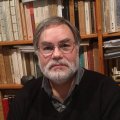
Carlos Coros Villca
Antropólogo Físico, Kinesiólogo, Magíster en Gestión Educacional, Diplomado en Docencia Universitaria, en Gestión Universitaria, en Preparaciones anatómicas y en Museología. Académico de la Facultad de Medicina de la Universidad de Valparaíso y director del Museo Arqueológico de Los Andes. Ha participado en varios estudios arqueológicos como el descubrimiento y publicación del Qhapaq Ñan ramal Trasandino de Aconcagua, la descripción de la batalla entre Michimalongo con Pedro de Valdivia, la adscripción del cerro Mercacha a una Waka, los petroglifos del cerro Paidahuen y la publicación del libro "Los Arcaicos del Rutal”, como también ha publicado varios artículos; entre ellos uno sitios Incas de explotación ganadera en Aconcagua, otro de biomecánica del lanzamiento de Estólica y sitios habitacionales en Pirque asociados a la cultura Aconcagua y Llolleo. Actualmente trabaja en proyectos medioambientales relativos a la anatomía de fauna nativa, estudio de Polen e Histología botánica, como en proyectos asociados a la museología. Actualmente es miembro del Consejo Asesor del Servicio Nacional de Museos del Servicio Nacional del Patrimonio Cultural de Chile.
Speakers
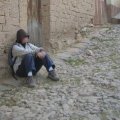
Karina Elisabet Aranda Alvarez
La Paz Archaeological Society, Full member
Archaeologist graduated from the Archaeology program at the Universidad Mayor de San Andrés in La Paz. She has worked on various archaeological projects in the highlands, valleys, and eastern Bolivia. Her most significant work has been carried out over the past 23 years, focusing on the fascinating and often overlooked archaeological history of the La Paz Valley (Bolivia) and its surroundings. She worked in the conservation of paleontological specimens at the National Museum of Natural History and as a specialist in the analysis of lithic artifacts for various archaeological projects. As a member of the La Paz Archaeological Society, she is engaged in a determined battle to defend Bolivian archaeological, cultural, and natural heritage, managing and promoting public policies for its protection and safeguarding. She is also an activist committed to vindicating the rights of indigenous peoples to territory and self-determination, which has led her to produce popular radio programs in collaboration with the feminist collective Mujeres Creando. Her intellectual output includes several books and articles on the archaeology of La Paz; the protection of cultural heritage; territorial planning and environmental impact.
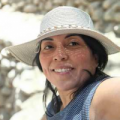
Sofia Chacaltana Cortés
Magíster y doctora por la Universidad de Illinois en Chicago, realizó un posdoctorado en el Field Museum de Historia Natural de Chicago. Centra su investigación en los procesos de colonización y migración en la región andina de Sudamérica durante los periodos prehispánico e hispánico, y en cómo estos han contribuido a la construcción de nociones de raza y género, así como a la distribución desigual de la riqueza en las sociedades latinoamericanas, incluido el Perú moderno. Actualmente, investiga las dinámicas hídricas y sociales contemporáneas en los acueductos subterráneos de Nasca, así como el impacto del cambio climático en la calidad del agua desde una perspectiva de género. Es autora de diversas publicaciones en revistas académicas de alto impacto y de libros especializados en su campo. Su trabajo tiene un enfoque interdisciplinario y ha recibido múltiples subvenciones de investigación, entre ellas las otorgadas por la National Science Foundation de EE. UU. (NSF), la Beca de Investigación Riva-Agüero de la Pontificia Universidad Católica del Perú, el programa de movilidad ERASMUS+ de la Unión Europea y el financiamiento para Proyectos de Investigación en Ciencias Sociales de Prociencia-CONCYTEC, entre otras.

Carlos Coros Villca
Antropólogo Físico, Kinesiólogo, Magíster en Gestión Educacional, Diplomado en Docencia Universitaria, en Gestión Universitaria, en Preparaciones anatómicas y en Museología. Académico de la Facultad de Medicina de la Universidad de Valparaíso y director del Museo Arqueológico de Los Andes. Ha participado en varios estudios arqueológicos como el descubrimiento y publicación del Qhapaq Ñan ramal Trasandino de Aconcagua, la descripción de la batalla entre Michimalongo con Pedro de Valdivia, la adscripción del cerro Mercacha a una Waka, los petroglifos del cerro Paidahuen y la publicación del libro "Los Arcaicos del Rutal”, como también ha publicado varios artículos; entre ellos uno sitios Incas de explotación ganadera en Aconcagua, otro de biomecánica del lanzamiento de Estólica y sitios habitacionales en Pirque asociados a la cultura Aconcagua y Llolleo. Actualmente trabaja en proyectos medioambientales relativos a la anatomía de fauna nativa, estudio de Polen e Histología botánica, como en proyectos asociados a la museología. Actualmente es miembro del Consejo Asesor del Servicio Nacional de Museos del Servicio Nacional del Patrimonio Cultural de Chile.

Victoria Dominguez Sandoval
Arqueóloga con más de 30 años de experiencia en prospecciones, excavaciones e interpretación de hallazgos en ocupaciones de la costa, sierra y oriente, así como en la preservación y conservación de sitios arqueológicos. Es experta en análisis e interpretación de sitios arqueológicos. Posee un sólido conocimiento de las secuencias ocupacionales de las sociedades prehispánicas del país, lo que le ayuda a emprender investigaciones claras y detalladas en el campo de la arqueología. A cargo de la restauración de varios sitios arqueológicos en el país, con el fin de poner en valor estos recursos arqueológicos. Ha sido Presidenta del Colegio de Arqueólogos y Arqueólogas del Ecuador, Directora de la Dirección de Áreas Arqueológicas, Paleontológicas y Patrimonio Subacuático a cargo de la gestión sobre la conservación y preservación del patrimonio arqueológico del país y de la elaboración de distintos instrumentos legales para normalizar las investigaciones arqueológicas y la gestión del patrimonio en general a nivel nacional. A cargo de la primera Reserva de Investigaciones Arqueológicas denominada Resfa Parducci que posee el país, donde se resguarda una muestra amplia de bienes arqueológicos que proceden de todas las regiones del Ecuador

Víctor Alberto Durán
Licenciado en Antropología con especialización en Arqueología. Facultad de Ciencias Naturales. Universidad Nacional de La Plata. 1982. Doctor en Ciencias Naturales, orientación Antropología. Facultad de Ciencias Naturales. Universidad Nacional de La Plata. 1997. Especialidad: Arqueología de sociedades agro-pastoriles en ambientes áridos y de altura de los Andes Centrales argentino-chilenos. Arqueología de paisajes sagrados en el límite meridional de la expansión inca.

Iñaki Garcia Camino
Doctor en Historia por la UPV/EHU. Director de numerosas excavaciones arqueológicas en yacimientos urbanos y rurales de la edad media. Hasta 2011 fue arqueólogo del Servicio de Patrimonio Cultural de la Diputación Foral de Bizkaia y desde entonces se encarga de la dirección técnica del Arkeologi Museoa que es el centro de depósito de los materiales arqueológico del territorio. Hasta 2021 fue profesor tutor de Historia Medieval de la UNED (Centro asociado de Bergara). Sus líneas de investigación se han centrado en el estudio del poblamiento de la Edad media y en la feudalización de la sociedad empleando fuentes arqueológicas, así como en la catalogación y difusión del patrimonio Cultural. Es autor de diversos trabajos sobre la alta edad media y los museos y coordina la publicación “los Cuadernos del Arkeologi”.
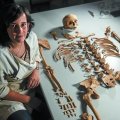
Maite Iris García Collado
Arqueóloga medieval especializada en arqueología biomolecular y osteoarqueología humana para entender las sociedades históricas, especialmente la alimentación y la movilidad de las poblaciones del pasado. Su interés principal son las sociedades medievales del sur de Europa, pero también ha trabajado en contextos de época romana y moderna. Sus temas de investigación principales se centran en los sistemas agrarios y las prácticas sociales, incluyendo las estrategias de distinción, la exclusión social y las identidades personales. Ha participado en proyectos arqueológicos en el País Vasco, el norte de España, Toscana y el sur de Francia. También tiene experiencia en la docencia universitaria y ha trabajado en arqueología comercial como osteoarqueóloga humana. Es autora de una veintena de publicaciones en revistas científicas y monografías y ha participado en conferencias y seminarios en más de diez países. Además, colabora regularmente en iniciativas de divulgación científica. Actualmente es investigadora postdoctoral en el centro BioArCh del Departamento de Arqueología de la Universidad de York (Reino Unido), donde forma parte del proyecto MEDGREENREV financiado por el ERC de la Unión Europea.
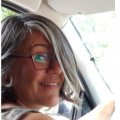
Alejandra Valeria Gasco
Miembro de la Comisión Académica del Doctorado en Ciencia y Tecnología de la Facultad de Ciencias Exactas y Naturales (FCEN), UNCuyo. Responsable del Repositorio de Bienes Arqueológicos Patrimoniales de la FCEN-ICB. Con diferentes métodos como anatomía comparada, osteometría (estadística exploratoria uni, bi y multivariada), isótopos (carbono, nitrógeno y estroncio) y ADNa, aborda el registro arqueofaunístico con el propósito de establecer las estrategias de subsistencia (caza/ganadería de camélidos) desarrolladas por los grupos humanos que habitaron diferentes ambientes de altura durante los últimos seis milenios en los Andes centro-sur. Desarrolla líneas de trabajo vinculadas a la etnografía de pastores, la conservación del patrimonio y la comunicación pública de la ciencia. Coordina acciones de extensión, gestión y conservación preventiva de bienes arqueológicos patrimoniales en el Repositorio Oficial del LPEH. Experticia en Evaluaciones de Impacto Ambiental. Dirige varios proyectos de investigación y extensión; forma recursos humanos de grado universitario y posgrado.
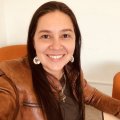
Juliana Gómez Mejía
Antropóloga egresada de la Universidad Nacional de Colombia (2005) con especialización en Antropología Forense (2006) y Maestría en Antropología (2011) de la misma universidad. Graduada como doctora en Ciencias Biológicas de la Universidad de Sao Paulo, Brasil (2016) y actualmente Profesora Asociada del Departamento de Antropología y Sociología de la Universidad de Caldas. Coordinadora del Laboratorio de Antropología Biológica y la línea de investigación en Bioarqueología. Cuenta con 20 años de experiencia en el manejo y análisis de restos óseos humanos en contextos arqueológicos. Los principales trabajos de investigación se centran en el estudio biocultural de restos óseos humanos en contextos arqueológicos de diversos sitios de Brasil, Perú y Colombia. Actualmente, lidera un proyecto sobre condiciones de vida en poblaciones prehispánicas del Cauca Medio, y participa activamente en el proceso de análisis científico de restos óseos humanos de diversos contextos funerarios.
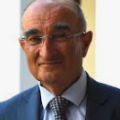
Ricardo Izquierdo Benito
Doctor en Historia Medieval por la Universidad Complutense de Madrid. Fue Profesor del Colegio Universitario de Toledo y Profesor Titular de Historia Medieval en la Universidad Complutense. En el año 1990 se incorporó a la Universidad de Castilla-La Mancha como catedrático de Historia Medieval, siendo director del departamento de Historia y Decano de la Facultad de Humanidades de Toledo. Sus investigaciones, recogidas en varios libros y artículos han tratado sobre arqueología medieval (especialmente centrados en el mundo andalusí; sobre todo en el yacimiento de Vascos) y sobre el ámbito urbano (con especial dedicación a la ciudad de Toledo). Ha participado en numerosos congresos y encabezado varios proyectos de investigación. Es Académico Numerario de la Real Academia de Bellas Artes y Ciencias Históricas de Toledo y de la Academia de Ciencias Sociales y Humanidades de Castilla-La Mancha. Ha recibido varios reconocimientos entre ellos el Premio “Reconocido 2016 del Profesorado de la UCLM” concedido por el Consejo Social de la Universidad de Castilla-La Mancha, el de Hijo Adoptivo de Toledo el año 2018 y en 2019 el de Socio de Honor de la Asociación Española de Arqueología Medieval.
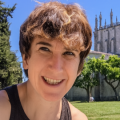
Aitziber Lekuona Ilundain
Elle est licenciée en Histoire à l’Université du Pays Basque (EHU) et est entrée dans le domaine de l’archéologie par l’intermédiaire de la Fondation Arkeolan, où elle a travaillé à plusieurs reprises entre 2006 et 2014. En ce qui concerne la recherche historique, elle a collaboré à plusieurs projets avec le groupe de recherche sur le Haut et le Moyen Âge de l’Université du Pays Basque. Elle a obtenu à deux reprises (en 2013 et en 2017) la bourse José Ignacio Tellechea Idígoras des Archives Générales de Gipuzkoa, en réalisant deux travaux de recherche : « La donation du monastère de Saint-Sauveur d’Olazabal. Proposition pour délimiter et comprendre l’espace » (en basque), et « Le territoire de Saint-Sébastien et d’Hernani entre les XIe et XIIe siècles » (en espagnol). Actuellement, elle concilie son travail d’enseignante d’Histoire dans l’enseignement secondaire et le baccalauréat avec la recherche historique, en collaborant à la ligne de recherche sur la territorialité du haut Moyen Âge, coordonnée par le professeur Juan José Larrea de l’Université du Pays Basque, au sein du groupe de recherche Sociétés, processus, cultures (VIIIe-XVIIIe siècles).
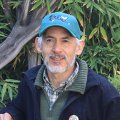
Carlos Ricardo Lémuz Aguirre
Graduated in archaeology from the Universidad Mayor de San Andrés, professor of the Archaeology program at UMSA, consultant in Archaeological Impact Assessment, and researcher at the Institute of Anthropological and Archaeological Research at the Universidad Mayor de San Andrés. Currently, he is vice president of the Archaeology Society of La Paz, Bolivia. He has conducted research and consulting activities in archaeology for 20 years, having directed regional studies in various areas of the Lake Titicaca basin, as well as extensive surface studies for road projects, public buildings, and mining and oil activities in different regions of Bolivia and Peru.
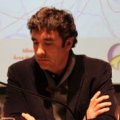
Alberto León Muñoz
Doctor por la universidad de Córdoba y profesor titular de Arqueología en la misma universidad. siendo su línea principal de investigación en la actualidad la centrada en el urbanismo andalusí, arquitectura defensiva medieval, arqueología de la Arquitectura, y gestión de la Arqueología Urbana. Forma parte del grupo de investigación Sísifo, marco en el que participa con el proyecto: La Arqueología como base documental de la interpretación histórica: un modelo para la investigación, gestión y difusión del Patrimonio Arqueológico cordobés. Premio “Palacio de la Merced. V Edición” (2001). Diputación de Córdoba.

Juan Manuel Llanos Chaparro
Juan Manuel Llanos Chaparro es Antropólogo y Magíster en Antropología de la Universidad Nacional de Colombia, sede Bogotá, con un Doctorado en Arqueología de la Universidad del Centro de la Provincia de Buenos Aires. En la actualidad es profesor de planta, adscrito al Instituto de Educación a Distancia -IDEAD- de la Universidad del Tolima. Investigador de los Grupo “Arqueología y Ambiente” del Instituto de Ciencias Naturales de la Universidad Nacional de Colombia y “Antropologías Contemporáneas -AION-“de la Universidad del Tolima. Su interés profesional abarca los campos del patrimonio cultural, las dinámicas territoriales y los procesos socioambientales prehispánicos y contemporáneos. Entre sus publicaciones se incluyen; Artefactos de Molienda en la Región del Medio Río Caquetá (Amazonia, Colombiana) 1997, Pautas de Asentamiento Prehispánicas en la Cuenca Baja del Río Saldaña (Municipio de Saldaña-Tolima) 2001, El Tolima Milenario, Un Viaje por la Diversidad 2011, Primer Taller de Orfebrería Prehispánica Excavado en Colombia (s. IX-XVI d.C.) 2015, además, es autor de varios artículos en publicaciones especializadas recientes. Actualmente es director de la maestría en Territorio, Conflicto y Cultura adscrita a la Faculta de Cienc

Valentina Mandakovic Seyler
Arqueóloga (Universidad de Chile) y Magíster en Antropología (Universidad de Tarapacá), con más de diez años de experiencia en investigación, consultoría arqueológica y trabajo en terreno, especializada en arqueobotánica. He desarrollado investigaciones principalmente en el Norte Grande de Chile, especialmente en la Pampa del Tamarugal, enfocándome en la interacción entre poblaciones prehispánicas y el paisaje vegetal del Desierto de Atacama. Mi trabajo aborda prácticas de recolección, agricultura temprana y transformación del entorno mediante el uso forestal. En 2025 dicté la cátedra de Arqueobotánica en la Universidad Alberto Hurtado. Soy coautora de artículos publicados en revistas académicas como Latin American Antiquity, Estudios Atacameños, Chungara, Revista Chilena de Antropología, Nature Plants y Surveys in Geophysics. Con destacadas habilidades de liderazgo, planificación, análisis crítico y articulación entre investigación científica y gestión del patrimonio cultural.
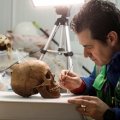
Lino Mantecón Callejo
Lino Mantecón es arqueólogo profesional con más de 25 años de experiencia en el campo de la arqueología de urgencia, la gestión del Patrimonio Cultural, la restauración arquitectónica, la puesta en valor de yacimientos arqueológicos, proyectos museográficos y la investigación. Su trayectoria profesional ha estado ligada a las etapas históricas y protohistóricas. Ejemplo de ello son sus intervenciones en yacimientos de la Edad del Hierro y romanos y, especialmente medievales, así como en el Patrimonio Caminero. Entre los trabajos más mediáticos destaca la intervención arqueológica en la Catedral y Castillo del Rey de Santander y el castro de El Cincho, en co-dirección con Javier Marcos. Destacan sus intervenciones en los yacimientos romanos del sur de Cantabria de Camesa-Rebolledo y la Cueva y los castros de Monte Ornedo-Santa Marina y Las Rabas. Es conocido por sus estudios sobre minas romanas en Cantabria. También por los proyectos arqueológicos sobre necrópolis y edificios religiosos y militares medievales: como es la Colegiata de Santa Cruz de Castañeda, la Iglesia de Santa María de Bareyo, la ermita rupestre de Cadalso, la Iglesia de San Vicente de Potes, y San Martín de Tobía en Cabezón de la Sal, entre otros.
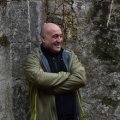
Javier Marcos Martinez
Autor de trabajos de investigación, en la mayoría de los casos asociados a arqueología histórica. Su labor profesional se vincula con la denominada arqueología de gestión, poseyendo una densa trayectoria de más de 25 años en proyectos ligados a la prevención, control y recuperación del patrimonio arqueológico y cultural. Se autodefine como “obrero de la arqueología”. Ha participado en el equipo redactor de la Carta Arqueológica de Cantabria (campo Roma – Edad Media) y de diversos ayuntamientos de dicha comunidad autónoma. Posee una especialización en intervenciones arqueológicas asociadas a restauraciones de edificios de interés histórico-artístico. Ha dirigido o codirigido intervenciones como la restauración de la iglesia románica (BIC) de Bareyo, la iglesia rupestre de Santa María de Valverde (Valderredible, Cantabria), cementerio de la iglesia gótica de Santa María de la Asunción de Castro Urdiales; necrópolis altomedieval asociada a la iglesia románica de San Juan de Rasines (BIC); Castillo, necrópolis y vestigios románicos en la iglesia colegial de los Santos Mártires, hoy día Catedral de Santander. Codescubridor e investigador del castro costero de la Edad del Hierro de El Cincho (Santillana del Mar).

Pascual Martínez Sopena
Carrera docente e investigadora en la Universidad de Valladolid, con intensa participación en proyectos internacionales, nacionales y regionales. Estancias en Francia (Universidad de Burdeos; École Normale Superieure y CNRS de París), Alemania (Universidad de Münster), e Italia (Università della Sapienza, Roma). Además de una intensa actividad docente, ha desarrollado una fructífera actividad investigadora centrado en la historia social de Corona de Castilla, con particular atención a los territorios del norte del Duero en los siglos X-XIII y la historia social de los reinos de León y Castilla (siglos X-XIII), así como al estudio de la nobleza castellana, los procesos de urbanización, el Camino de Santiago y la antroponimia. Entre sus numerosas publicaciones, cabe destacar "El Camino de Santiago y la articulación del espacio en Tierra de Campos y León", "La urbanización de Castilla y León en tiempos de Alfonso VI", "Repoblaciones interiores, villas nuevas de los siglos XII y XIII", "Ferias y mercados rurales en las provincias de la Corona de Castilla y de León entre los siglos X-XIII", "Mercados y ferias en la organización del espacio del Camino de Santiago", 'Sicut iam fuerat iudicatum Inter. Antecesores suos et meos'.
Experienced Independent Consultant and Researcher in Archaeology, with a demonstrated history of working in museums and the development industry. Skilled in GIS, Remote Sensing and ISO Standards. Professional graduated as Archaeologist atUniversidad Mayor de San Andrés (bachellor), GIS Specialist at Universidad Andina Simón Bolívar (postgraduate) and QHSSE expert at Universidad Internacional Isabel I de Castilla (magister). He is an academic author published on multiple international platforms and his writings relate to Archaeoastronomy, Rock Art, GIS in Archaeology and Social Sciences, Museums, Archaeological Impact Assessment and Mitigation, Tiwanaku, and Ancient Cultures in the Bolivian Lowlands.
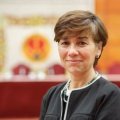
Eloisa Ramírez Vaquero
Catedrática de Historia Medieval en la Universidad Pública de Navarra. Su docencia y tareas de investigación se centran en la etapa pleno y bajomedieval. Ha formado parte, o la forma en la actualidad, de grupos de trabajo en diversos proyectos y/o programas de investigación, tanto locales, como nacionales e internacionales. Participa en diversos comités de trabajo y asesores de revistas, entre ellos el de las Semanas Internacionales de Estudios Medievales de Estella. Sus líneas de trabajo se refieren, sobre todo, a los grupos sociales, el mundo urbano, el patrimonio y hacienda regias, así como la consolidación de los resortes de gestión y de poder de la monarquía. En los últimos años se ha centrado en la historia del poder político, su legitimación y articulación, en particular desde el siglo XII al XIV.También le han interesado otras cuestiones relacionados con el resto de los aspectos de la historia medieval del reino de Navarra, en obras, coloquios y colecciones de investigación académica, así como la edición de diverso tipo de fuentes documentales. De forma paralela a estas ocupaciones, relacionadas con espacios más estrictamente académicos, colabora con frecuencia en otro tipo de obras y actividades de carácter divulgativo
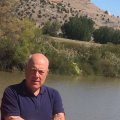
Manolo Retuerce
Especialista en Arqueología Medieval y Moderna: fortificación, poblamiento, cerámica, metales y numismática. Además de realizar más de 40 Cartas y prospecciones arqueológicas en España y el extranjero, ha intervenido o dirigido más de 160 excavaciones arqueológicas. Entre ellas, los castillos o murallas de Madrid (Cuesta de la Vega, Pza. de Oriente. Pza. de los Carros), Calatalifa (Villaviciosa de Odón); Ponferrada, Mansilla de las Mulas y Cornatel (León), Alba de Tormes (Salamanca); "La Mota" de Medina del Campo, San Pedro de Latarce e Íscar (Valladolid); Castrotorafe, Carbajales de Alba y Villalpando (Zamora), Calatañazor, Osma, Ágreda, Almazán, San Pedro Manrique y Gormaz (Soria); Atienza y Jadraque (Guadalajara); Cuenca y Huete (Cuenca); Talavera de la Reina (Toledo); Calatayud (Zaragoza); isla de Chicly (Túnez). Más el hospital de Hontanas (Burgos), en el Camino de Santiago; la catedral de Salamanca; la iglesia de Santa Mª de Calatañazor (Soria); el Centro minero de Almadén, Corral de Comedias de Torralba de Calatrava (Ciudad Real); barrio de Samhane, en la ciudad al-Diriyah (Riad, Arabia Saudí), etc. Desde 1984 hasta la actualidad, es director del Proyecto arqueológico de Calatrava la Vieja (Ciudad Real).

Francisco Singul
Doctor en Historia del Arte, miembro del Comité Internacional de Expertos del Camino de Santiago, comisario de exposiciones, secretario de la revista de investigación Ad Limina, autor de diversos libros de temática jacobea y numerosos artículos de investigación.

María Mercedes Urteaga Artigas
Gipuzkoako Foru Aldundia/Diputación Foral de Gipuzkoa, Arkeologia teknikaria /Técnica en Arqueología
Licenciada y doctora en Arqueología por la Universidad de Valladolid, cuenta con una dilatada trayectoria profesional en la que ha compaginado la investigación, la docencia, la gestión y la creación de equipamientos culturales. Ha sido directora del Curso de Formación de Jóvenes en Arqueología Urbana, técnico arqueólogo y técnico de patrimonio cultural del Gobierno Vasco, coordinadora del Máster de Patrimonio Artístico y Arqueológico de la Universidad del País Vasco y de una larga lista de acciones formativas. Destaca su labor al frente de la Fundación Arkeolan, entidad desde la que se ha encargado de la puesta en funcionamiento y dirección del museo Oiasso, de la creación del Festival Internacional de Cine Arqueológico del Bidasoa, de la puesta en valor de la minería romana de Arditurri y de un amplio etcétera. Autora de varios libros y decenas de artículos, trabaja en la actualidad en la Dirección de Cultura de la Diputación Foral de Gipuzkoa.
Registration fees
| Live online | Until 02-09-2025 |
|---|---|
| 10,00 EUR |
Venue
Online
Online
Online
Online
